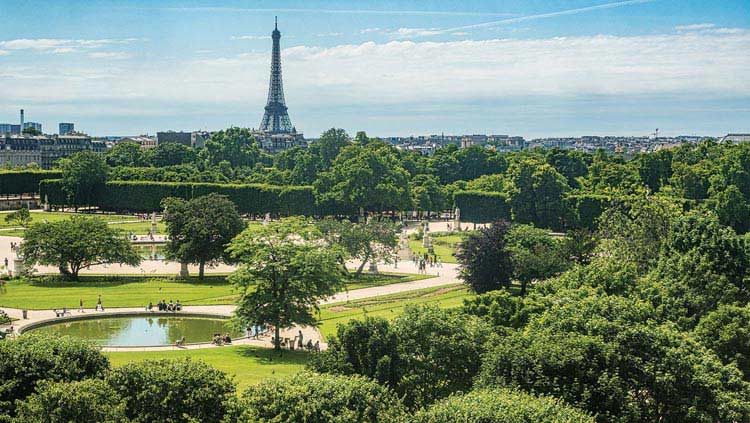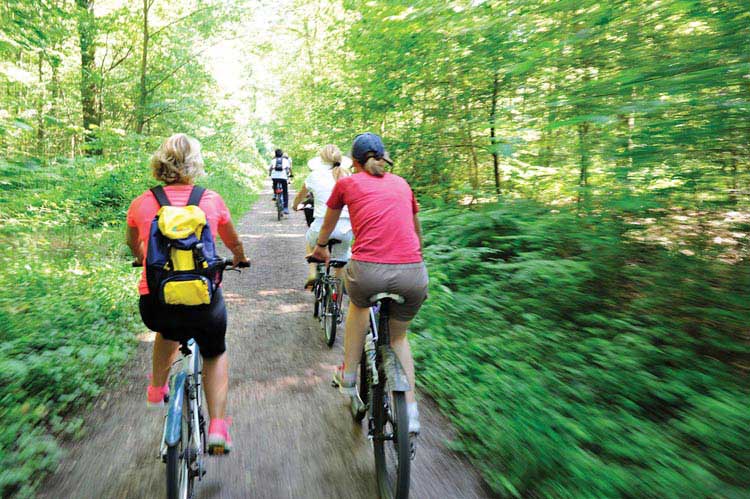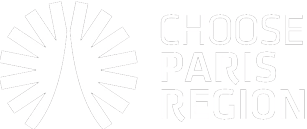A Sustainable Region
Advancing Sustainability Through Business | Environmentally Responsible Urban Planning | Positive Social Impacts
Paris Region is deeply committed to promoting sustainability. The Region’s actions are centered around three main themes: advancing sustainability through business, environmentally responsible urban planning, and promoting projects which have a positive social impact. Home to 18% of France’s population on only 2% of the national territory, Paris Region’s aim is to offer its citizens a breathable and greener environment through sustainable and carbon-free urban planning. Sustainable development is a at the heart of all regional policies.

As a response to the climate change imperative, public investments for environmentally friendly projects will increase to €10 billion by 2025 as a means to accelerate the ecological transformation of the Region over the next 5 years. This will create numerous opportunities for businesses as well as encourage innovation.
Ensuring positive social impacts is a major priority for municipalities in Paris Region. Across these towns, different policies have been put in place all with the same goals: developing more socially responsible businesses and creating stronger links between the local economy and citizens.
In addition, Paris Region supports the Sustainable Development Goals and Agenda 2030 and is committed to the Decade of Action launched by UN Secretary-General António Guterres early in 2020.
Advancing Sustainability Through Business
Paris Region is a leading marketplace in Europe for business development, R&D and technological, environmental, and social innovation. According to the OECD, 40% of France’s green patents originate in Paris Region thanks to a thriving and innovative sustainable ecosystem. The key factors to this success are to be found in the Region’s considerable sustainable urban planning project, green constructions, and on the great focus put on a circular economy.
Wekiwi chose Paris Region to market its green, affordable, and sustainable energy solutions. Read the success story here
Experimenting With Urban Sustainability
Sustainable construction is a huge industry in Paris Region.
Paris Region collaborates with and supports companies wishing to try and test innovative projects regarding urban agriculture development, air quality, wastewater treatment, recycling and smart energy, etc. Urban experimentation means testing innovative devices or approaches (designed but not yet marketed) in real-life urban conditions.
More than 500 urban projects have been rolled out since 2010 by Paris Region’s government, Paris&CO’s Urban Lab, Numa’s DataCity Lab and others, all supportive of sustainable projects within Paris Region. For instance, Cleaner Air is an experimental program launched by Paris Region in 2018 with a €1 million financial package to 5 companies with solutions to improve the air quality in underground public transport spaces. In addition, Paris Region and SNCF are also experimenting on a technology that would allow the absorption of particles released by breaking trains. The first project received a regional grant of €225,000.
The City of Paris is currently working with a startup to better assess the air quality surrounding nurseries and K-8 schools. Together, they announced the installation of an additional 150 monitoring stations that assess air quality.
Among the latest initiatives to date is the Urban Innovation District driven by Paris&Co on 400 hectares of land. 15 projects were selected on September 25, 2019 and will gradually test their solutions focusing on three main themes: circular economy, flow and mobility management and the use of public space.
Incentives for Green Construction
To design the city of tomorrow, Paris Region’s government, municipalities and intermunicipal bodies are shifting their call for projects, their business contracts and policies to adhere to a more modern and environmentally friendly urban renewal.
Five international campaigns have been launched since 2014 on 150 sites in the Paris Region. This is for innovative urban projects that contribute to a high quality, dynamic and sustainable urban future. Altogether this represents 2,485,218 square meters of land that will be sustainably developed.
Since 2016, 115 Innovative and Ecological Neighborhoods, have already invested more than €140 million in 44 development projects, which aim to build whole new neighborhoods with low ecological impacts.
Placing sustainability at the heart of urban planning strategy, Paris Region is prioritizing environmentally friendly buildings by choosing materials based on how they are recycled, installed, and used. These projects will provide the French capital with innovative venues while shaping the face of a sustainable metropolis that innovates both in the techniques of urban development and in the experience of its residents and visitors.
.jpg)
Developing the Circular Economy
In 2019, Paris Region’s government adopted a regional circular economy strategy, centered around 15 themes, in collaboration with a large ecosystem of local players. A recent law aims to reduce waste from single use plastics and packaging, creating more requirements regarding the reuse and recycling of construction waste. The regulations will be phased in between January 1, 2021 and January 1, 2023.
In addition, local circular economy strategies emerging in Paris Region, are often supported by intermunicipal bodies and primarily target waste recovery. For example, municipalities have launched experimental industrial and environmental initiatives in the construction sector by creating an online market for materials that would otherwise be considered waste.
These efforts also attempt to tackle environmental issues in the logistics sector by addressing the issues of the last mile and river transport on the Seine. Many initiatives have introduced in the food sector to optimize the use of resources, change production methods and establish more sustainable agricultural activity (urban agriculture, and a second life for food). Many companies with extremely innovative circular economy projects thrive in Paris Region and are key players to economic development.
To encourage all these actions and to network those who wish to create a circular economy, the Grand Paris Circulaire website, developed by the Metropole du Grand Paris organization, is a platform to share notable initiatives, advice, encourage projects, and ultimately promote the use of the circular economy in the Paris region.
We Support Foreign Companies Launching Their CSR Strategies
A significant ecosystem of players serving responsible businesses are already well-established in Paris Region. At Choose Paris Region, we do everything we can to accelerate the movement, and contribute to the growth of local cleantech. Choose Paris Region connects companies with services and support networks allowing them to adapt their businesses to be environmentally and socially responsible. This network enables groups and individuals to share good practices, and all the gathered information supports the scaling up of CSR activities in companies of all sizes and across all sectors.
Please contact us to get more information about this service.

Environmentally Responsible Urban Planning
Paris Region has been at the forefront of the green revolution. Ever since it hosted the COP21 conference and finalized the Paris Agreement, the Region has vowed to become a carbon-neutral area by 2050. As a result, the Region is supporting ambitious projects to make the city greener and promote sustainable transportation options, urban agriculture and even the possibility of swimming in the Seine. In accordance with these ambitions, in 2020 Paris Region allocated €10 billion to be invested in environmental projects over the next 5 years, which will help accelerate the ecological transformation of the area.
Active Mobility, Bicycles and Electromobility
In Paris Region, 850,000 journeys are made by bicycle every day. Paris Region and the regional transportation authority wish to encourage the use of bicycles as a sustainable means of transport by offering all residents the opportunity to try out an electrically assisted bicycle (EAB).
In September 2019, the regional transport authority launched Véligo Location, a bike rental service.20,000 bicycles are available through a monthly subscription of €40 for a period of 6 or 9 months, 50% of which may be reimbursed by the user’s employer. The service will benefit 200,000 Paris Region residents over the first 6 years. The goal is to allow users the opportunity to test out an EAB for their personal use over a short period of time to demonstrate how an electric bike could fit into their current lifestyle.
As of February 2020, Paris Region provides partial reimbursements for the purchase of a new electrically assisted bicycle. This subsidy may be 50% of the purchase price up to a limit of €500 per bicycle and per applicant after the deduction of any local aid. The total budget represents €12 million. The city of Paris is offering a similar reimbursement program to its residents.
The French government has made €20 million available to encourage cycling, including €50 in grants for bike maintenance and subsidies for parking areas, and bike lanes.
The coronavirus pandemic has provided even more incentive to get around by bicycle, whether to avoid the risk of infection on crowded public trains and buses or to reduce our carbon emissions. The Region will continue to encourage initiatives that promote the adoption of safe, clean, and affordable alternatives to the car.
Paris Region: Heading the E-Mobility Revolution
Innovative Clean Buses
Paris Region is a pioneer in incorporating the use of hydrogen powered buses. The first two started operating in Paris Region during the summer of 2019 on line 264 between Jouy-en-Josas and Versailles-Chantiers in a trial run to test the potential for this type of vehicle. The Region plans to buy 47 standard hydrogen buses by 2026 (17 between 2023 and 2024 and 30 between 2024 and 2026).
This is one step forward in the ecological transition the Region is pursuing, with the goal of having a large number (almost 5,000 buses) of fully clean buses in dense areas by 2025 and in the rest of the Region by 2029.
New Rapid Transit Lines in the Outer Suburbs - Grand Paris Express
A fully automated metro line is being built to encircle Paris, providing sustainable transport options in areas that are currently very car centric. Named the Grand Paris Express, the project includes 200 kilometers of new lines (twice the existing Paris metro network) and 68 new stations. The new lines are being built according to seven environmental principles, aiming to minimize the negative impacts and maximize energy and resource efficiency during both construction and use. This massive infrastructure project will better connect Paris to various strategic centers in the Region: urban centers, business centers, international airports, and high-speed train stations.
With trains scheduled every 2 to 3 min, the project will offer a robust substitute for automobiles, supporting a clean densification of the Metropolitan Paris Area while reversing urban sprawl.
Feeding the City With Agritech
Recently in the Paris Region, Vertical farms, rooftop vegetable gardens and urban farms have been flourishing. Urban farming was an element in 60% of the winning projects of the Inventing the Greater Paris Metropolis campaign for innovative urban projects.
Bringing farms into the city first requires establishing green spaces and habitats that will allow biodiversity to flourish. Green roofs are an effective solution to combat heat islands, as they replace black, dry roofs with green, lush, and moist nature. They also absorb up to 50% of rainwater, thus easing the pressure on drainage systems.
Currently, Paris Region has 73 hectares of urban agriculture and a dynamic Agritech business ecosystem made of innovative startups shaping the future of our cities.
Swimming in the Seine and Marne Rivers
By 2025, swimmers will be able to bathe in the Marne River and the Seine. Between 2022 and 2025 a total of 24 swimming sites in the Marne and Seine rivers and on the Saint-Denis and Ourcq canals will become accessible to the public. All were selected after an initial technical feasibility analysis to comply with the quality level required by European law.
For the 2024 Paris Olympic Games, the triathlon and open water swimming events will take place in the Seine. The Games have been a catalyst for the development of these swimming sites, which will become a legacy of the Games in the capital.

Positive Social Impacts
Not only does the Paris Region offer a great quality of life for its residents, it welcomes and encourages the development of businesses making a positive social impact. Through multiple initiatives, the Region supports the local economic integration of companies and the development of a stronger support network for those less fortunate in society. Notably, the Region has made gender equality one of its priorities, particularly through entrepreneurship opportunities. Furthermore, the Region has introduced initiatives to encourage B2B activities within the local ecosystem of social impact businesses.
Deep Local Economic and Social Integration
Paris Region is committed to keeping strong local ties with businesses and encourages companies to prioritize their integration in the local economy. Numerous initiatives have already been put in place in different municipalities, such as establishing a CSR charter or supporting companies in responsible procurement with a focus on using local service providers. The requirements regarding large project grant funds can also be used to promote local economic integration.
There are also specific consultancy services available to assist companies with social integration into the local ecosystem, particularly regarding hiring and employment. As such, companies participate in joint projects with local companies, associations, schools, universities, public institutions, residents and other local players and members of society.
Women Entrepreneurship
Paris Region has made a commitment to promoting gender equality in its policies and programs. Therefore, an online public consultation platform was set up to collect and prioritize proposals for the promotion of gender equality in employment and training. As a result, the Region has established policies that aim to improve women’s access to employment and to promote women entrepreneurship.
Many initiatives have been put in place including the Elles de France prize, launched in 2018 to highlight the work of outstanding women in the Paris Region. Paris Region is also the Home of the Women’s Forum for the Economy & Society, a global platform to highlight women’s voices and visions while building a more inclusive economy and society.
Furthermore, there is a dynamic female entrepreneurship ecosystem in the Region with initiatives like the startup incubator, Willa, which assists women-run projects. Women Business Angels is the first network of female business angels in Europe, bringing together nearly 150 women who personally invest in high-potential startups and support their launch and development.
Developing a Positive Impact Economy
France has special policies for the third sector and social impact companies, calling it the Social and Solidarity Economy. Paris Region has its own approach towards the Social and Solidarity Economy, which represents 6.7% of the Region’s companies and 7.1% of the Region’s employees. The Region promotes and encourages companies to do business with social impact businesses, through responsible procurement.
For example, the platform ESS 2024 aims to ensure that the Olympic and Paralympic Games in Paris are sustainable, integrated in the local economy and beneficial to residents. The site helps social change businesses to connect with Paris’s Olympics-related opportunities and become at the heart of the organization of the Olympic and Paralympic Games. It allows organizers and solidarity-based companies to create economic and employment opportunities, specifically for vulnerable communities. It also facilitates the integration of sustainable organization of the Games maximizing innovation making positive social and environmental change in the Region.
